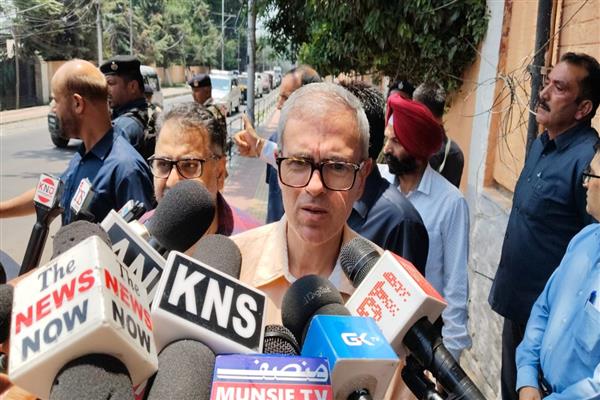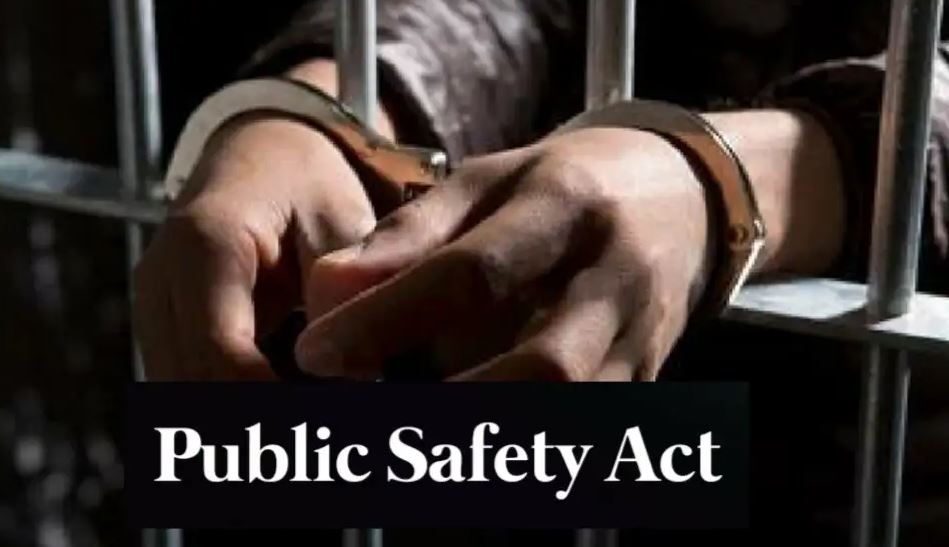A Volatile Strike Echoes Loudly in Kashmir
By: Javid Amin | Srinagar | 14 June 2025
The recent Israeli military strike on Iran has not only escalated tensions in the Middle East but also ignited a wave of political outrage and street-level protest in India’s Jammu & Kashmir region. Leaders from across the Valley — known for its sensitive geopolitical pulse — have condemned what they see as an unprovoked act of aggression that endangers global stability.
As world powers scramble to respond diplomatically, Kashmiri voices — both political and public — are rising in condemnation, reflecting the emotional and ideological connection the Valley shares with struggles in Palestine, Iran, and the broader Muslim world.
Omar Abdullah Compares Israeli Strike to Russia-Ukraine Conflict
‘A Preemptive Strike Without Provocation’
Former Chief Minister and National Conference vice-president Omar Abdullah didn’t mince words in his response. Drawing parallels between Israel’s strike and Russia’s invasion of Ukraine, Abdullah accused Tel Aviv of launching a “preemptive strike without provocation” — a move he said violated all norms of international diplomacy and peacekeeping.
“It is unacceptable for a nation to act as judge, jury, and executioner,” Abdullah said in a press statement issued from Srinagar. “The world stood united against Russia’s invasion of Ukraine, but now it’s eerily silent. The same standards must apply to all, or the very concept of global justice collapses.”
Abdullah’s criticism also targeted India’s Ministry of External Affairs. He urged the government to prioritize the safety and evacuation of Kashmiri students currently studying in Iranian universities — many of whom are reportedly stranded in cities close to impacted areas.
“We must not wait for another emergency. The Indian government has a responsibility to its citizens, especially those caught in the crossfire abroad,” he emphasized.
Mehbooba Mufti: ‘A State Gone Rogue’
A Call for Global Accountability and Muslim Unity
PDP (People’s Democratic Party) president Mehbooba Mufti, never one to shy away from blunt political commentary, called the Israeli action “yet another brazen act by a state that appears to have gone rogue.”
In a strongly worded public address, she lambasted not only Western powers but also Muslim-majority nations for what she described as “willful negligence” and “spineless diplomacy.”
“Western nations that preach democracy and human rights are complicit through silence. Muslim nations, too, must reflect on their inaction. The time for lip service is over,” she said.
Mufti warned that such “double standards” — where global condemnation seems selective depending on the actors involved — are a serious threat to world peace and to the very credibility of international institutions like the UN and ICC.
Her address was laced with emotion, reflecting a sense of betrayal and urgency that resonated with many in the Kashmir Valley, where similar themes of occupation, aggression, and resistance form a historical backdrop to political identity.
Mirwaiz Umar Farooq: ‘This Is State Terrorism’
Hurriyat Chairman’s Strong Words on Israeli Aggression
Mirwaiz Umar Farooq, chairman of the All Parties Hurriyat Conference and the region’s most influential religious-political figure, delivered perhaps the most severe condemnation of all. In a sermon at Srinagar’s historic Jamia Masjid, the Mirwaiz called the Israeli airstrike “state terrorism” and labeled Israel “a rogue state and a threat to world peace.”
“This is not just an attack on Iran; it is an attack on humanity, on justice, and on international law,” he said during Friday prayers, as thousands of worshippers listened in solemn silence.
He expressed unwavering solidarity with the people of Iran and Palestine, saying that Kashmiris — who themselves have faced prolonged political and military conflict — understand the pain of “external aggression masked as national security.”
The Mirwaiz also urged the Organisation of Islamic Cooperation (OIC) to hold an emergency meeting and consider sanctions or unified diplomatic pressure to halt further Israeli provocations.
On the Ground: Protests Erupt Across Kashmir Valley
From Budgam to Kargil: Voices Rise in Solidarity
While political leaders issued sharp condemnations, the streets of Kashmir provided a more visceral, immediate response. In Budgam — home to a large Shia Muslim population — massive protests broke out within hours of the news. Demonstrators, many of them students and youth activists, held placards reading “Israel is a Terrorist State”, “Down with Zionist Aggression”, and “Stop the War on Muslims.”
Similar demonstrations were held in Kargil, Srinagar’s Lal Chowk, and parts of Pulwama and Anantnag. Protestors raised pro-Iran, pro-Palestine, and anti-Israel slogans. Roadside gatherings turned into candlelight marches by evening, with many citizens expressing deep concern over the potential for a broader war.
“This isn’t just about Iran or Israel — this is about humanity,” said a student protestor in Srinagar. “When injustice happens anywhere, it’s our duty to speak.”
Local Imams and clerics used Friday sermons to voice concern and pray for peace. Shia clerics especially were vocal, warning that if unchecked, such acts could spark a wider regional war involving Hezbollah, Syria, and other allies.
A History of Kashmir’s Emotional Ties to Global Muslim Issues
Why This Conflict Feels Personal in the Valley
Kashmir’s deep-rooted emotional and ideological connection to global Muslim issues — from Palestine to Syria to now Iran — is neither accidental nor opportunistic. The people of the Valley, who themselves live under a militarized and politically sensitive environment, have long identified with struggles for sovereignty, justice, and dignity.
From school essays to university seminars and mosque sermons, names like Yasser Arafat, Qasem Soleimani, and Ayatollah Khomeini are part of the collective Kashmiri consciousness. The attack on Iran thus strikes a raw nerve — not just geopolitically, but emotionally and spiritually.
“Kashmiris see these global events through the lens of their own history and suffering,” says political analyst Dr. Shabir Rather. “That’s why there’s such a strong grassroots response.”
Silence of Global Powers and the Hypocrisy of Selective Outrage
Is the World Playing Favourites in the Middle East?
The “deafening silence” of global powers — particularly the United States, European Union, and even the United Nations — has not gone unnoticed in Kashmir. Many see this as part of a disturbing trend: one set of rules for allies, and another for adversaries.
India’s Ministry of External Affairs has yet to release a formal statement either condemning or supporting the Israeli action — a silence that has been criticized by leaders across the political spectrum in Kashmir.
“If this had been any other nation, there would be emergency UN sessions and global sanctions,” noted Mehbooba Mufti. “But when Israel does it, there’s a silence that speaks volumes.”
This silence has only amplified the anger and resentment in the Valley, particularly among young Kashmiris who increasingly use social media to stay informed and mobilized.
Kashmiri Students in Iran: Fear, Uncertainty, and Pleas for Help
A Diplomatic Test for the Indian Government
As the conflict intensifies, several Kashmiri students studying in Tehran, Qom, and Mashhad have reached out through social media and student networks, asking for evacuation assistance and expressing fear for their safety.
Videos circulating online show students holed up in dormitories, with limited access to transport or embassy services.
“We are terrified. There are military convoys on the roads, and flights are either cancelled or full. We need help,” said one Kashmiri medical student in a viral WhatsApp video.
Political leaders have urged the Indian government to arrange emergency evacuation flights and coordinate with the Iranian authorities to provide safe corridors for students and workers stuck in high-risk areas.
What Lies Ahead: A Region on the Brink
Will This Spark a Larger Conflict — and What Could It Mean for Kashmir?
The Israeli airstrike, and the ensuing possibility of Iranian retaliation, threatens to destabilize the already fragile balance in the Middle East. Analysts warn that a broader conflict involving Iran, Hezbollah, Syria, and potentially even global superpowers could have cascading effects — not least for regions like Kashmir, where foreign policy often intersects with local sentiment.
There are fears that if India is forced to take a diplomatic stance, it could affect domestic politics in Jammu & Kashmir, polarizing communities further.
“This is no longer just an international story — it’s domestic now,” says Prof. Rafiq Khwaja, a political scientist at Kashmir University. “The stakes are dangerously high.”
Bottom-Line: A Call for Peace and Principles
The Israeli strike on Iran has rattled not just Tehran or Tel Aviv, but also the faraway valleys of Kashmir. Political leaders from all major parties — from Omar Abdullah to Mehbooba Mufti and Mirwaiz Umar Farooq — have spoken in one voice: condemning the aggression and calling for an end to global hypocrisy.
The public, too, has risen in protest — from the streets of Budgam to the mosques of Srinagar. For Kashmir, this moment is more than a distant war. It’s a reflection of its own yearning for justice, solidarity, and peace in a world increasingly divided by interests rather than ideals.



